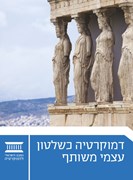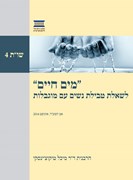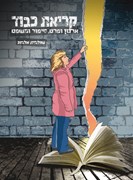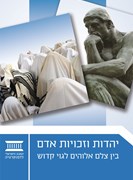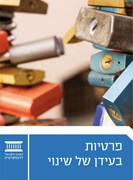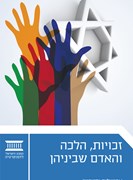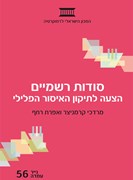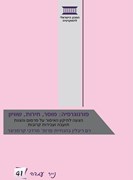

Publications Regarding human dignity
Articles

The Sde Teiman HCJ Judgment: Too Little, Too Late?
Written By: Prof. Amichai Cohen, Prof. Yuval Shany
A recent judgment of the Israeli Supreme Court held that conditions in a notorious detention center must comply with Israeli law.

The Crossroads between Ethics and Technology
Written By: Dr. Tehilla Shwartz Altshuler
"Israel and other Western Democracies must carefully consider the negative ramifications of excelling in technology while disregarding moral and ethical questions." Read Dr. Tehilla Shwartz Altshuler's latest in Techcrunch

House Demolition at the Israeli Supreme Court: Recent Developments
Written By: Prof. Yuval Shany, Prof. Amichai Cohen
In its fight against terrorism, Israel has often been proud of its ability to effectively fight terrorism, while remaining faithful to democratic principles. House demolitions were always considered a necessary evil, which could be resorted to in very exceptional circumstances - are we now facing populist trends that runs contrary to the traditional ethos of subjecting counterterrorism policies to rule-of-law constraints.
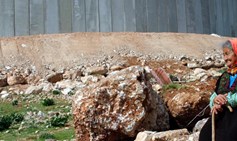
In Israeli Residency Case, Individual Responsibility vs. Collective Punishment
Written By: Colonel (Res.) Dr. Liron A. Libman
While collective harm may be justified in some circumstances, collective punishment should never be allowed: one person’s rights should not be taken hostage to influence the behavior of others.
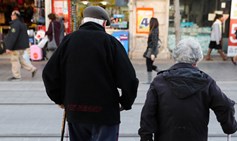
Living in Dignity
Written By: Prof. Eytan Sheshinski, Rachel Zaken
Our Democracy Index shows that while Israel’s citizens love their country and are optimistic about its future, they feel a lack of confidence about their personal futures.
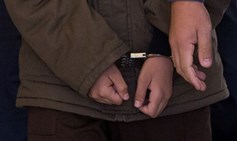
It’s Time to Stop the Use of Administrative Detention in Israel
Written By: Dr. Amir Fuchs
Is administrative detention an appropriate response to Jewish terror such as the events in Duma? Dr. Amir Fuchs argues that there is no justification for administrative violations of a person’s freedom except for in concrete emergencies in which criminal law would be impossible to apply.
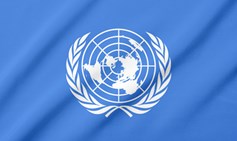
A Betrayal of International Law
Written By: Prof. Mordechai Kremnitzer
In a Jerusalem Post op-ed, Prof. Mordechai Kremnitzer argues that by breaching their responsibility to be impartial, the UN Human Rights Council and its commission for investigating alleged war crimes in Gaza are betraying international law, even if unintentionally.

Shmita: Rest, Share, Release
Written By: Prof. Yedidia Z. Stern
An exploration of the existential, social, and economic dimensions of the Shmita year, that calls for bringing together social, moral, cultural, religious and national forces to implement the idea of Shmita in non-agricultural and national contexts in Israel.

Mourning for Gazan Children Isn't Left-Wing
Written By: Prof. Mordechai Kremnitzer
IDI Vice President Prof. Mordechai Kremnitzer discusses the High Court of Justice's decision to uphold the Israel Broadcasting Authority's rejection of an infomercial in which the names of Gazan children who were killed in Operation Protective Edge would have been read aloud.
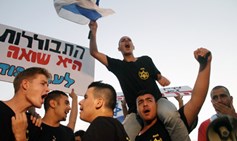
On Intermarriage, Judaism, and Democracy in Israel
Written By: Benjamin (Benny) Lau
Rabbi Dr. Benjamin Lau shares thoughts on the tension between Judaism and democracy, in response to the public protests against the marriage of a Jewish woman who converted to Islam and an Israeli Arab.

The "Anti-Pardon" Bill: Laws are not a Substitute for a Backbone
Written By: Dr. Amir Fuchs
In an article in <em>The Times of Israel</em>, Attorney Amir Fuchs argues that legislation that would give judges the authority to sentence murderers to life in prison with no possibility of pardon is misguided and will not prevent terrorists from being released in future prisoner exchanges.

A Royal Sanctuary: Three Scenes for Jerusalem Day
Rabbi Dr. Benjamin (Benny) Lau presents three snapshots from different times and places, reflecting on a city that combines ancient and modern, sacred and secular, eternal truths and ordinary life.

My Jerusalem: Thoughts for Jerusalem Day
Written By: Prof. Mordechai Kremnitzer
IDI Vice President Prof. Mordechai Kremnitzer shares thoughts on Jerusalem, which symbolizes what is most beautiful and exalted in Jewish culture: the commitment to law and morality, to justice and mercy.

Force-Feeding Prisoners: A Serious Violation of Human Dignity
Written By: Dr. Amir Fuchs
In an op-ed in <em>Maariv</em>, Attorney Amir Fuchs warns that force feeding hunger striking prisoners is a serious violation of human dignity, and should not be permitted in order to serve public relations efforts of the State of Israel.

A Jewish State Warrants Our Sacrifice
Written By: Prof. Yedidia Z. Stern
IDI Vice President Prof. Yedidia Stern reflects on the privilege of sacrifice and the necessity to maintain a Jewish Israel in order to justify that sacrifice, in an article written for Remembrance Day for the Fallen of Israel's Wars and Victims of Terrorism.
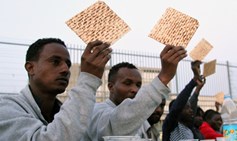
The Lessons of Passover: We are the Other
Written By: Prof. Yedidia Z. Stern
Prof. Yedidia Z. Stern asserts that if we see ourselves as "other" and identify with the stranger, the poor, and people with disabilities, historic redemption of our ancestors from Egypt will be an ongoing redemption for our generation.

On Leadership and Responsibility: The Lessons of the Purim Story
Written By: Shira Ruderman, Benjamin (Benny) Lau
Rabbi Dr. Benny Lau and Shira Ruderman, Israel Director of the Ruderman Family Foundation, share thoughts on the Purim story, leadership, responsibility, and repair of the world.

Have No Fear: On the Inclusion of People with Intellectual Disabilities in Society
Written By: Benjamin (Benny) Lau, Shira Ruderman, Admiral (Res.) Amichay (Ami) Ayalon
An op-ed by IDI Senior Fellow Admiral Ami Ayalon, Project Head Rabbi Dr. Benny Lau, and Shira Ruderman of the Ruderman Foundation, stressing the need to dispel the fear of the Other and the Different.

Do You Have to Earn Dignity?
Written By: Prof. Tamar Hermann
Is dignity something that must be earned? Prof. Tamar Hermann, Head of IDI's Guttman Center for Surveys, explores this question, as IDI's Israel Speaks project assembles 200 citizens to begin drafting a Declaration of Human Dignity.

International Disabilities Day 2013: Human Rights and Judaism in Action
Written By: Benjamin (Benny) Lau
In honor of International Day for Persons with Disabilities, Rabbi Dr. Benjamin (Benny) Lau updates us on IDI's efforts on behalf of people with disabilities and reveals that people with guide dogs are now allowed to access the Western Wall.

Organized Criminals Today, Everyone Else Tomorrow
Written By: Lina Saba
In an op-ed in Haaretz, Attorney Lina Saba-Habesch warns that extending the use of administrative detention to apply to suspects in cases of organized crime could lead to the use of this extreme method, or of other extreme methods, in combating other forms of crime.

Using Administrative Detention to Combat Organized Crime
Written By: Aviad Ben Yehuda
Aviad Ben Yehuda discusses the problematic nature of the proposal to extend the use of administrative detention in Israel from the war on terror to the war on organized crime.

Prof. Mordechai Kremnitzer Speaks Out on Using Administrative Detention in Cases of Organized Crime
Written By: Prof. Mordechai Kremnitzer
IDI Vice President of Research Prof. Mordechai Kremnitzer responds to the possibility that the police will use administrative detention to combat organized crime, much in the manner as it is used to combat terrorism.

License to Discriminate: A Jewish and Undemocratic State
Written By: Prof. Mordechai Kremnitzer, Shiri Krebs
A bill entitled "Basic Law: Israel – The Nation State of the Jewish People" is currently being considered by the Knesset. Although it was sponsored by a large number of Knesset members from a both the coalition and the opposition, the bill is controversial as it may disrupt the delicate balance between the "Jewish" and "democratic" identities of the State of Israel. In this op-ed, IDI Vice-President Prof. Mordechai Kremnitzer and Researcher Adv. Shiri Krebs argue that the bill is unnecessary and counterproductive to the goal of a Jewish and democratic Israel.

The Security Check Appeal: Another Extension of the Judgment
Written By: Eli Bachar
Eli Bahar, former legal adviser to the General Security Service, analyzes the Israeli Supreme Court’s decision to postpone ruling on a petition requesting the elimination of ethnic security checks in Israeli airports.
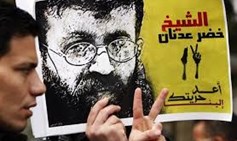
Is Administrative Detention the Right Tool for Fighting Terrorism?
Written By: Elad Gil
On February 21, 2012, just before the High Court of Justice was to hear his petition, Palestinian detainee Khader Adnan agreed to end his life threatening hunger strike after Israeli authorities agreed to release him in April, at the end of four months of administrative detention. Attorney Elad Gil explores basic questions about the use of administrative detention in Israel and highlights lessons learned from the Adnan affair.

It isn't for the State to Promote Arab-Jewish Coexistence
Written By: Yair Sheleg
In an op-ed from <em>Haaretz</em>, IDI Research Fellow Yair Sheleg responds to the law allowing admissions committees in small community settlements to bar new residents who do not suit the “lifestyle and social fabric” of the community.


